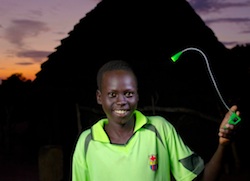As you spend the weekend sprawled on the couch watching football and reading the newspaper, don’t take for granted the light that helps you watch TV and read. In many emerging countries, light is created by burning a kerosene lamp which is equivalent to smoking two packs of cigarettes a day. Yet without light, people in third world countries without electricity are left in the dark.
Osei Darwka, president of Ghana Telecom University and a fierce advocate of education, wants every household in his country to replace kerosene –– the fuel commonly used in home lighting –– with a healthier, safer, more environmentally friendly alternative that will allow schoolchildren to read and study in the evening.
 The solution? A LED reading light that is eight times more efficient than in incandescent light bulb. The reading light was developed by John Bowers and his team at the University of California Santa Barbara and the Institute for Energy Efficiency. The LED light contains a solar cell that is efficient enough that a small area will provide a sufficient charge for the LED. Just two hours of light each day provides one hour of illumination. And operating with a single rechargable battery means the cost is kept low- much lower than the cost of kerosene.
The solution? A LED reading light that is eight times more efficient than in incandescent light bulb. The reading light was developed by John Bowers and his team at the University of California Santa Barbara and the Institute for Energy Efficiency. The LED light contains a solar cell that is efficient enough that a small area will provide a sufficient charge for the LED. Just two hours of light each day provides one hour of illumination. And operating with a single rechargable battery means the cost is kept low- much lower than the cost of kerosene.
So far, over 20,000 lights have been sent to 43 countries.
This is just one example of how students, professors and alums of the University of California are recreating “The California Dream” and helping to improve the world. This story is the first in University of California’s “Onward California” series. The episodes feature John Bowers and the value he and his team are bringing to society.

